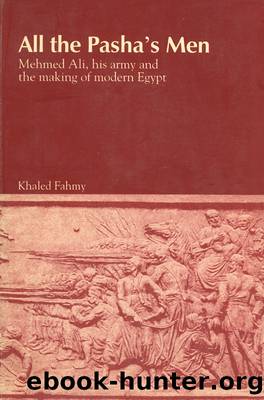All the Pasha's Men by Khaled Fahmy

Author:Khaled Fahmy [Fahmy, Khaled]
Language: eng
Format: epub
Tags: History, Middle East, Egypt, Biography & Autobiography, Military, Political Science, Political Ideologies, Nationalism & Patriotism
ISBN: 9781617972379
Google: ulTbAgAAQBAJ
Publisher: American University in Cairo Press
Published: 2002-03-01T03:13:39+00:00
The Pasha and the spectacle of the army
On the face of it, the army offered a very impressive spectacle of order and discipline that is often said to have characterized Mehmed Aliâs entire reign. Its machine-like, disciplined and orderly appearance was not something that was discovered intuitively, or on closer inspection; rather, it was one of its essential components and its visual aspect was intended to be stunning and overwhelming. It was, literally, a spectacular thing. There is some evidence that this nature of the new army that clearly distinguished it from previous armies (e.g. the Mamluk army) was already apparent to Mehmed Ali and his senior officers. We have already seen in chapter 2 how impressed he was when he saw his assembled troops for the first time in the BanÄ« âAdÄ« camp in 1824. On a number of other occasions we see the Pasha using the army to impress the spectator, whether a foreign visitor or the local population of a conquered country. When in 1827, for example, the Pasha was visited by Süleyman Pasha, the vali of Crete, orders were issued to the Director of the War Department to chose 200 of the best officers, have them wear their âceremonial uniformsâ (kisvet-i divaniye) and stage a small parade for the visitor to watch.24 Shortly after the fall of Acre in May 1832, the fortress was visited by an English officer who had recently arrived from Egypt. To impress him, orders were issued to all officers and soldiers in the castle to put on their new uniforms and âto be in the most perfect order.â25 On victoriously entering cities in Syria the soldiers were ordered to put on their special uniforms and to march in an orderly way through the cities for the inhabitants to see them.26 (When a certain lieutenant refused to put on his ceremonial uniform he was sentenced to three daysâ âlight arrestâ).27
Beyond these spectacles of order and discipline, however, lay a different picture altogether. What one sees behind this spectacular façade is indicative of the problems that the Pasha encountered in building his new army: officials cheating him, corrupt officers abusing their power, inefficient bureaucrats trying only to appease the Pasha, and even the Pasha himself occasionally passing inconsistent and sometimes contradictory orders.
A good example of the problems lying behind these façades of orderly spectacles is the way the officers attempted to get around the conditions laid down by the Pasha and his military authorities. In the early years of the army Mehmed Ali could not afford to wait till all his officers learned how to read and write. He wrote to Ibrahim Pasha telling him that âalthough the European armies have literate officers and engineers, we cannot afford to do the same when we establish our new regiments.â28 Eventually, however, literacy, and (oddly enough) good handwriting became a condition for promotion,29 and it was decided that all candidates should provide samples of their handwriting for the Pasha to make sure that they were indeed literate.
Download
This site does not store any files on its server. We only index and link to content provided by other sites. Please contact the content providers to delete copyright contents if any and email us, we'll remove relevant links or contents immediately.
| Bahrain | Egypt |
| Iran | Iraq |
| Israel & Palestine | Jordan |
| Kuwait | Lebanon |
| Oman | Qatar |
| Saudi Arabia | Syria |
| Turkey | United Arab Emirates |
| Yemen |
Empire of the Sikhs by Patwant Singh(23069)
The Wind in My Hair by Masih Alinejad(5085)
Rise and Kill First by Ronen Bergman(4776)
The Templars by Dan Jones(4681)
The Rape of Nanking by Iris Chang(4200)
12 Strong by Doug Stanton(3541)
Blood and Sand by Alex Von Tunzelmann(3192)
Babylon's Ark by Lawrence Anthony(2671)
The History of Jihad: From Muhammad to ISIS by Spencer Robert(2618)
No Room for Small Dreams by Shimon Peres(2362)
The Turkish Psychedelic Explosion by Daniel Spicer(2352)
Inside the Middle East by Avi Melamed(2349)
Gideon's Spies: The Secret History of the Mossad by Gordon Thomas(2337)
Arabs by Eugene Rogan(2292)
The First Muslim The Story of Muhammad by Lesley Hazleton(2263)
Come, Tell Me How You Live by Mallowan Agatha Christie(2246)
Bus on Jaffa Road by Mike Kelly(2150)
1453 by Roger Crowley(2022)
Kabul 1841-42: Battle Story by Edmund Yorke(2020)
